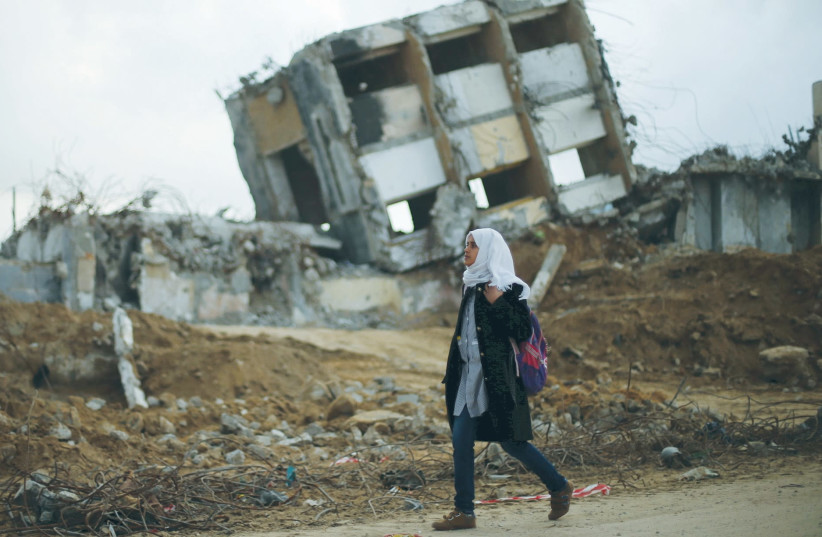The IDF announced on Thursday that its internal October 7 report will grapple with decisions made in real-time, though portions of it will examine events as far back as the 2014 Gaza conflict. Interim results are expected in June.
March 7 was the first time the IDF publicly affirmed that it would initiate a probe, saying at the time that it would investigate at least as far back as 2018; on Thursday, it said it would also examine the Gaza conflict that took place in the summer of 2014.
Probe to go farther back than stated initially, will analyze previously undealt with issues
In March 2018, Hamas initiated a low-intensity border conflict, rife with protests. Hamas Gaza Chief Yahya Sinwar led the move after resuming leadership of the enclave in February 2017. The scope of the timeline could hold implications for Prime Minister Benjamin Netanyahu, who was premier for four and a half out of the six years being reviewed – until 2018.

Implications await war cabinet minister Gadi Eisenkot, who was IDF chief of staff from 2015 to 2019; Aviv Kohavi, who served as IDF chief from 2019 until January 2023; and, naturally, all current IDF and defense officials, including IDF Chief of Staff Lt.-Gen. Herzi Halevi, Shin Bet chief Ronen Bar, and IDF intelligence chief Maj.-Gen. Aharon Haliva.
If that was the only cut-off, it could have skipped over war minister Benny Gantz, who was IDF chief from 2011 to 2015, before the March 2018-2024 time frame. But if it goes back to mid-2014, it will also include the time frame when Gantz was chief.
Some have suggested that a review of the failed policies leading to the October 7 failure needed to go back to Operation Cast Lead in 2008-2009, to Hamas’s taking control in Gaza in 2007, or even back to the Second Intifada, when the decision was made not to carry out a major anti-terror operation as that carried out in 2002 in the West Bank during Operation Defensive Shield.
According to the latest polls, Gantz has around double Netanyahu’s electoral support for the next Knesset if an election is held now, and on Wednesday he called for elections in September.
The 2018 time frame of the report could help Gantz against Netanyahu, while the 2014 time frame, specifically regarding IDF intelligence, could equalize things.
Military sources said the report could not go back forever because it would take too long to produce results.
There was still no mention of whether an external review, which was originally planned, would still happen or, if so, when.
Absent this external review, the military was unclear about how IDF officials in the Operations Command could objectively judge Halevi, who outranks everyone there, as well as a few other officials, including Haliva, who is at the same level as the IDF Operations Command Chief-Maj. Gen. Oded Basiuk.
However, the air force noted that it would be involving both a reservist brigadier general and a reservist colonel – very senior officers – to perform portions of its probe.
In contract, the Southern Command said its probes would be carried out by the brigadier generals, colonels, and lieutenant colonels who were in place before, during, and after October 7, without outside oversight from reservist officers.
Initially, it was unclear why only the air force included outside oversight. But later, IDF sources said that the air force simply has more reservists as part of its standard operations than any other arm of the military.
Halevi’s explanation has been that the probe is being carried out “to restore confidence to evacuated persons” from the South and North.
He said that the IDF and the country must learn from the tragedy and improve itself both on defense and on the attack.
Furthermore, Halevi said that the IDF failed the country’s civilians and that “it is hard to say we learned our lesson to the citizens of Israel without this probe.”
The probe will look into the IDF’s concept of the border, understanding Hamas, and how to prepare operationally for defending the country. It will also look into the intelligence and decision-making processes surrounding October 7, with a particular focus on the processes of defense between October 7 and October 10.
Although the overall instructions for the probe seem to only go up to October 10, some of the general probes and some of the specific command probes, such as the Southern Command, will also look into the war with Hamas after October 10.
For instance, in addition to Halevi’s and the entire IDF Southern Command’s broader perspectives, Southern Command will have a colonel or lieutenant colonel independently investigate each specific battle they fought.
Five key IDF positions that will be analyzed include Nahal Oz, Kissufim, Erez, Pagah, and Re’im.
The IDF divisions being probed in the Southern Command include the Gaza Division and Divisions 99, 36, 162, 98, and 252.
With roughly half the strength it had earlier in the war, Division 162 is currently the only one remaining in northern and central Gaza, and Division 98 is the only one remaining in southern Gaza.
The probe will also look at the method of rallying the reserves, the handling of logistics issues, and the process of evacuating Israeli civilians and the bodies of killed civilians from the borders, but these will be secondary to October 7 and the decisions leading up to October 7.
The navy, home front command, operations command, communications, and technology command will be probed as well.
